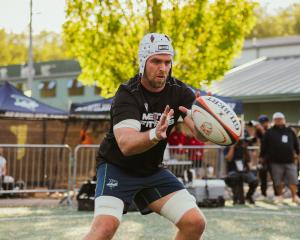
Highlanders winger Fetu'u Vainikolo was fined $1000, ordered to undergo counselling, given a formal warning and dropped for tonight's game against the Hurricanes after he was found guilty of serious misconduct at a New Zealand Rugby Union employment hearing yesterday.
A member of the public complained to the Highlanders after Vainikolo threw a drink over a woman at a Dunedin bar last Saturday morning.
Vainikolo has apologised for his behaviour and the victim's family has accepted the apology.
Highlanders management decided to drop Vainikolo for tonight's game, outside the NZRU punishment, as he had breached team protocols.
Vainikolo is the fourth Highlanders player in 12 months to get into trouble off the field.
Gary Hermansson, who has been a sports psychologist for the past 10 years with New Zealand Olympic and Commonwealth Games teams, and been involved with the Black Caps for the past three years, said players were under much more pressure in the professional era, and after a game was when they relieved that pressure.
Society had changed in the past 20 years, which had made it tougher for players.
"Probably 20 to 30 years ago we had that social welfare sort of philosophy when people stuck within a very narrow band of behaviour and people would function within that. But now that behaviour has gone," Hermansson said.
"The range of people's behaviour is different. They don't mind going over and making a big scene. There are more people out and about wanting to have a go at players. That makes it hard."
Hermansson, of Palmerston North, said perhaps rugby suffered from the macho image of not having or wanting to talk about many things before it was too late.
"Maybe the New Zealand Rugby Union has to look at 10 of the most at-risk players and put in suitable programmes for them."
Hermansson said if anything it was harder to be a sporting professional in New Zealand as the nation was very hard on its athletes.
"In Australia they still have a good section of the crowd which will chant `Aussie, Aussie, Aussie, Oi, Oi, Oi' no matter what.
"In England they have the Barmy Army who will support their team the very next day after the team has been badly beaten.
"But in New Zealand there is nothing like that. As a nation we are much more cautious. All we really see here is how bad it is. We make it very much personal and are very quick to criticise."
He said drinking was part of the New Zealand culture and the sporting environment was not immune.
"A drinking ban would never work as players would resent it and find ways round it. They have got to take some responsibility themselves."
Players with drinking problems had the option to either recognise they had a problem with alcohol and limit their intake or simply slowly slide into mediocrity.
He said four incidents among the Highlanders in the past year was a little on the high side.
"But you look at someone like Jimmy Cowan and the way he plays the game. He is aggressive and full of fire. That's what makes him a good player. But that makes him a risk in some environments off the field."
Cowan had been placed on an alcohol ban by the NZRU after separate disorderly behaviour incidents.
The biggest risk to players was right after the game, after the pressure of playing the game was released, Hermansson said.
Former All Black and Otago loose forward Paul Henderson said players were "absolutely" under much more pressure than when he played.
"We would get a break when we played but now there is so much more exposure from the media. They are under scrutiny all the time," Henderson said.
Henderson said when he played as an amateur there were plenty of times when the team played up.
"But there was something about playing for your province and playing for the jersey which allowed that sort of thing. You got away with it.
"That does not exist any more. But that is the way society has gone and players have to realise that."
He said with the market tightening up for players overseas, they had to realise that off-field incidents would turn off overseas clubs quickly.












